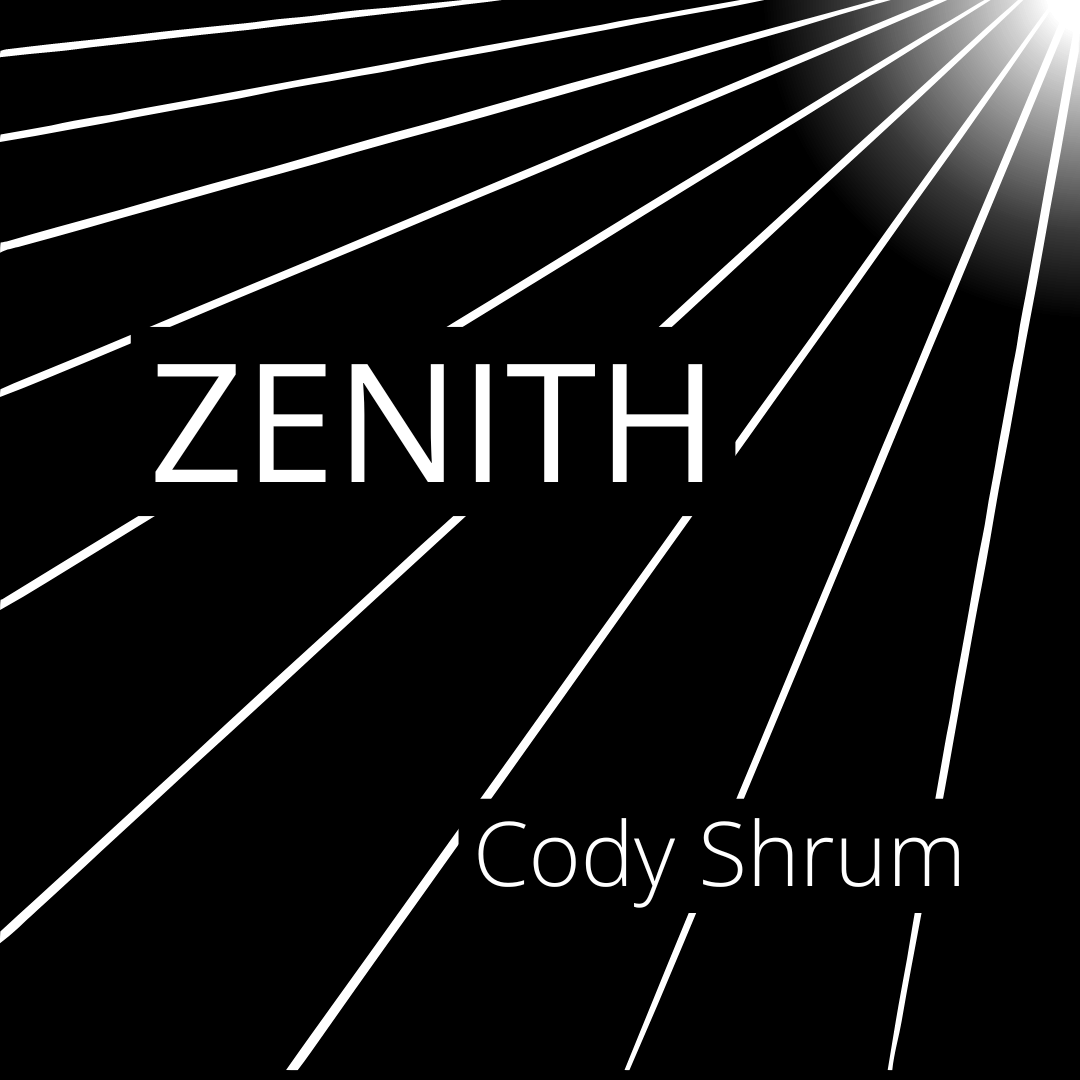ZENITH by Cody Shrum
Cody Shrum
ZENITH
Four of them were out that night: two brothers and a couple. They’d been howling at the moon, driving around, being kids—senior year, winter break. Wattles Road was just outside town, nobody around to bother them. The sky hanging over the town was dull gray, its belly full of snow.
The old car’s heater wasn’t worth a shit, so the cab was full of breath. Rock music blasted from the stereo, speakers huffing static. The older brother, the senior, tapped the song’s tune on the steering wheel. The car edged to the shoulder of the road where pavement turned to gravel. Up ahead was the railroad crossing, the one without crossing gates their mothers had warned them about.
The brothers got out of the car and went back to the trunk. The couple stayed inside the car, breath visible, leaned against one another. She said she’d rather be home, not out cruising. Why couldn’t they just be alone? He said they’d go soon, that he felt bad that Mikey only ever had his little brother to hang with.
Mikey yelled from behind the car that they were missing out. Mikey lit a joint, inhaled deep, the burn warming something dormant, held it in, passed the joint to his little brother. He shook his head, said no, but Mikey gave it to him anyway. The boy—he was just a boy—inhaled and coughed frantically. Mikey laughed as he exhaled his own plume of ditch weed smoke.
The couple exited the car, fingers threaded. The open air somehow felt warmer to the girl. She felt free out there, safer. Her boyfriend paid more attention to Mikey than to her. She didn’t want to smoke weed but knew he would. She was worried he’d lied, that they’d be out all night, that her parents would be angry with her again.
Get a load of this guy, coughing up a storm like he hasn’t smoked before, Mikey said.
I haven’t. I don’t really want to, his brother said.
Don’t be a baby. Hey, pass it over; let the other big kids have a turn.
He handed the joint to the girl who gave it right to her boyfriend. She knew he wouldn’t, couldn’t, say no. The little brother coughed some more. The coughs seemed to break the seal, summon the snow down all around them.
She thought the flakes were pretty, an ironic juxtaposition of natural beauty and whatever it was she was currently a party to. She held out a hand and the flurries dancing down to her skin were soft, she thought, like ash.
The boys passed the joint until it was gone. They giggled. Mikey got deep, said he felt close to God, that the snow was falling directly from the cosmos, that they were all meant for this moment, that this was all planned and there was no way of escaping the web of space-time that dictated this reality they were living out, right now. This had all been written out, somewhere.
Her hands, feet, neck, bones were cold. She rubbed her hands against her own arms, fabric-friction bringing at least some kind of warmth. Her boyfriend fell into Mikey’s banter about causality and the big bang. He was oblivious to her. She was just somebody he enjoyed, a body growing cold. She knew this wouldn’t last long. They’d break up soon, though she wasn’t sure which of them would initiate that pain.
They piled back into the car. The boys laughed, refueling the cab with breath and decibels. The car vibrated to life, its exhaust fuming.
Holy shit, I forgot about the railroad crossing, Mikey said. Dare me to park on the tracks?
Dude, I bet you won’t, the boyfriend said.
She looked at him. She had no idea who this person was. She now realized she’d be the one to end things. She’d do it.
Mikey drove the car onto the tracks. The boys cheered. They high-fived.
Just feels right, Mikey said. He killed the ignition.
Down the tracks, a bright light emerged, sent from the cosmos. It seemed to her a far-off moon brightening toward zenith.
Hey, c’mon. Let’s go. This isn’t funny, she said.
The boys just stared. The single pinprick of light became several golf balls. When the horn sounded, they jumped. Even she was caught off guard, paralyzed in the backseat, fingers gripping seat fabric.
Hey, fucking knock it off, Mikey, let’s go! she yelled, shaking his shoulder.
Mikey looked back, his face pure fear. In his silhouette from the growing light, the whites of his eyes popped; with his mouth agape, the teeth looked serrated. He stared at her like that for a second more, before he turned and fought the ignition. The younger brother and the boyfriend continued to look on.
The locomotive plowed toward them, eating up the tracks and darkness foot by foot. The horn screamed. By now the sound was solid, a shrill fermata growing louder, bound by the Doppler effect.
She tugged at her boyfriend’s hand, but he didn’t move. He, too, was paralyzed. She couldn’t see his face, had no idea what he looked like, couldn’t remember his face at all. She tried her door, kicked it open when the handle jammed. She tumbled out, then ran.
Later, she wouldn’t remember whether or not she screamed, told them to get out, begged them to come with her, did anything except get herself out.
The car’s brake lights ignited, just for a moment, before the cosmos, space-time, gathered up the car in the violent wake of its gravity.
◊
He was in a mood again. Lately, that’s how it was. As it turned out, mangling three teens in a gray 2005 Toyota Corolla with a locomotive made a man moody. He wasn’t sure what mood it was—something undefined, too well-defined, raw, vertiginous. He knew he felt something. It manifested itself in his joints, in his lower back, atop his spine.
He stood outside his house on a ladder, fixing a light fixture, when the rain started. First a drizzle, then hammering the earth with a biblical wall of dirty water. He was so close to fixing the damned thing that he kept on. It had been broken for months, since before the accident (as the railroad’s attorneys referred to it), and he was tired of having no light when he pulled up at night, an hour and a half from the train yard up in the city. His wife, too, had told him enough time had passed, that it needed to be fixed.
The fixture might have still been broken—he couldn’t be sure yet. He turned tight the last screw. As he screwed the bulb back in, the fixture shocked him and he slipped from the rungs of the ladder, fell to graveled earth. He wasn’t that high up, but he’d hit his head and was sure he was bleeding. More than his head, though, he was aware of all that water pounding his body, his clothes saturated and no longer absorbent, arms extended. Between the barrage of water pellets hitting him, the impossibly cacophonous roar, and his head, he couldn’t be sure if the light he’d just fixed was on or off. It looked bright yellow, steady one second, then the next it was dead. Full of light, then empty.
He yelled out in surprise when a hand grabbed his shoulder, his daughter.
“Are you okay? What happened?”
He looked up at her. She wore that bright pink raincoat he liked so much. It made him think of cotton candy. Her hair spilling from her hood darkened with water. He squinted through the rain, smiled.
She was yelling now, her voice registering louder than the storm. “Oh, shit, Dad, were you struck by lightning? Should I call an ambulance?”
“No. I’m . . . I’m fine, now.”
Lightning danced bright above somewhere and he waited for the boom but it never came. She helped him to his feet and the two made their way back inside, where it was dry, where everything was still in order. He knew his wife and son were in there somewhere, watching TV, safe. Blood trickling from his head, he winced, squeezed his daughter’s arm as she helped him. As they rounded the corner and up the back steps, he saw the light flick on, light barreling toward him down the tracks, then all quiet.
 Cody Shrum is a teacher and writer based in Kansas City. He has earned an MFA in fiction from the University of Missouri-Kansas City. Cody’s fiction and poetry have appeared in such journals as Identity Theory, Prime Number Magazine, Rust + Moth, and Harbor Review, as well as the anthology Kansas Time + Place: An Anthology of Heartland Poetry.
Cody Shrum is a teacher and writer based in Kansas City. He has earned an MFA in fiction from the University of Missouri-Kansas City. Cody’s fiction and poetry have appeared in such journals as Identity Theory, Prime Number Magazine, Rust + Moth, and Harbor Review, as well as the anthology Kansas Time + Place: An Anthology of Heartland Poetry.
Read more from Cleaver Magazine’s Issue #43.

